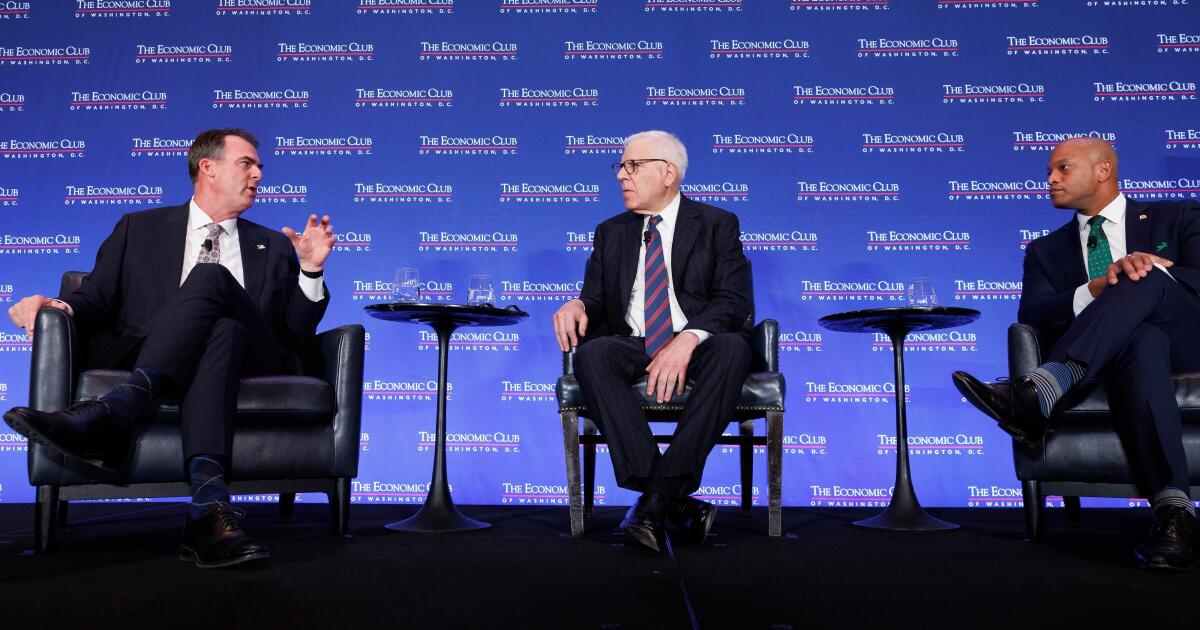California governor candidates pitch Democrats at convention
SAN FRANCISCO — It was speed dating: Eight suitors with less than four minutes each, pitching the woo to thousands of Democratic Party faithful.
The race for California governor has been a low-boil, late-developing affair, noteworthy mostly for its lack of a whole lot that has been noteworthy.
That changed a bit on a sunny Saturday in San Francisco, the contest assuming a smidgen of campaign heat — chanting crowds, sign-waving supporters, call-and-response from the audience — as the state party held its annual convention in this bluest of cities.
Delegates had the chance to officially endorse a party favorite, providing a major lift in a contest with the distinct lack of any obvious front-runner. But with an overstuffed field of nine major Democratic contenders — San José Mayor Matt Mahan was said to have entered the contest too late for consideration — the vote proved to be a mere formality.
No candidate came remotely close to winning the required 60% support.
That left the contestants, sans Mahan, to offer their best distillation of the whys and wherefore of their campaigns, before one of the most important and influential audiences they will face between now and the June 2 primary.
There was, unsurprisingly, a great deal of Trump-bashing and much talk of affordability, or rather, the excruciating lack of it in this priciest of states.
The candidates vied to establish their relatability, that most valuable of campaign currencies, by describing their own hardscrabble experiences.
Former Los Angeles Mayor Antonio Villaraigosa — the first speaker, as drawn by lot — spoke of his upbringing in a home riven by alcoholism and domestic violence. State Supt. of Public Instruction Tony Thurmond described his childhood subsistence on food stamps, free school lunches and surplus government cheese.
Former state Controller Betty Yee told how she shared a bedroom with four siblings. Katie Porter, the single mom of three kids, said she knows what it’s like to push a grocery cart and fuel her minivan and watch helplessly as prices “go up and up” while dollars don’t stretch far enough.

Michele Reed of Los Angeles cheers at the state Democratic Party convention.
(Christina House/Los Angeles Times)
When it came to lambasting Trump, the competition was equally fierce.
“His attacks on our schools, our healthcare and his politics of fear and bullying has to stop now,” Villaraigosa said.
Rep. Eric Swalwell (D-Dublin) called him “the worst president ever” and boasted of the anti-Trump battles he’s fought in Congress and the courts. Xavier Becerra, a former California attorney general, spoke of his success suing the Trump administration.
Porter may have outdone them all, at least in the use of profanity and props, by holding up one of her famous whiteboards and urging the crowd to join her in a chant of its inscription: “F—- Trump.”
“Together,” the former Orange County congresswoman declared, “we’re going to kick Trump’s ass in November.”
Porter was also the most extravagant in her promises, pledging to deliver universal healthcare to California — a years-old Democratic ambition — free childcare, zero tuition at the state’s public universities and elimination of the state income tax for those earning less than $100,000.
Unstated was how, precisely, the cash-strapped state would pay for such a bounty.
Former Assemblyman Ian Calderon offered a more modest promise to provide free child care to families earning less than $100,000 annually and to break up PG&E, California’s largest utility, “and literally take California’s power back.” (Another improbability.)
Becerra, in short order, said he was “not running on inflated promises” but rather his record as a congressman, former attorney general and health secretary in President Biden’s cabinet.

Rachel Pickering, right, vice chair of the San Luis Obispo County Democratic Party, stands with others wearing pins supporting Democratic causes at the party’s state convention.
(Christina House/Los Angeles Times)
It was one of several jabs that could be heard if one listened closely enough. (No candidate called out any other by name.) “You’re not going to vote for a Democrat who voted for the border wall, are you?” Thurmond demanded, a jab at Porter who supported a major funding bill that included money for Trump’s pet project.
“You’re not going to vote for a Democrat who praises ICE, are you?” Thurmond asked, a poke at Swalwell, who thanked the department for its work last year in a case of domestic terrorism.
“You’re not going to vote for a Democrat who made money off ICE detention centers,” Thurmond went on, targeting Tom Steyer and his former investment firm, which had holdings in the private prison industry.
Yee seemed to take aim at Mahan and his rich Silicon Valley backers, suggesting grassroots Democrats “will not be pushed aside by the billionaire boys club that wants to rule California.”
The barb was part of a full-on assault on the state’s monied class, which includes Steyer, who made his fortune as a hedge fund manager.
In a bit of billionaire jujitsu, he sought to turn the attack around by saying his vast wealth — which has allowed him to richly fund his political endeavors — made him immune to the blandishments of plutocrats and corporate interests.
“Here’s the thing about big donors,” Steyer said. “If you take their money, you have to take their calls. And I don’t owe them a thing. In a world where politicians serve special interests, I can’t be bought.”
There were no breakout moments Saturday. Nothing was said or done in the roughly 35 minutes the candidates devoted to themselves that seemed likely to change the dynamic or trajectory of a race that remains stubbornly ill-defined and, to an unprecedented degree in modern times, wide open.
And there was certainly no sign any of the gubernatorial candidates plan to give up, bowing to concerns their large number could divide the Democratic vote and allow a pair of Republicans to slip through and emerge from California’s top-two primary.
But for at least a little while, within the confines of San Francisco’s Moscone Center, there was a glimmer of a life in a contest that has seemed largely inert. That seemed a portent of more to come as the June primary inches ever closer.





